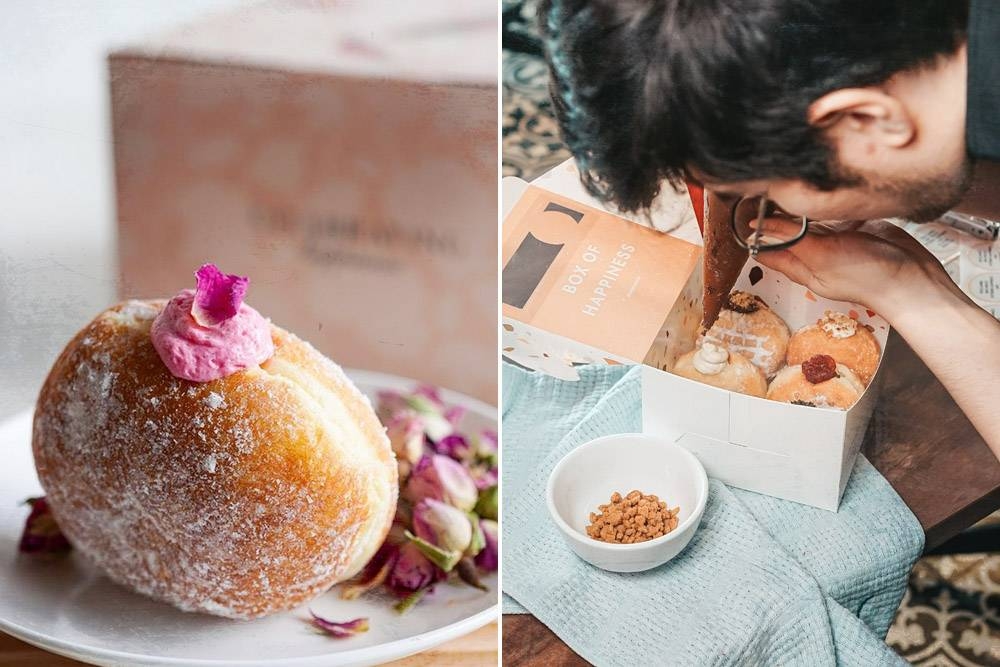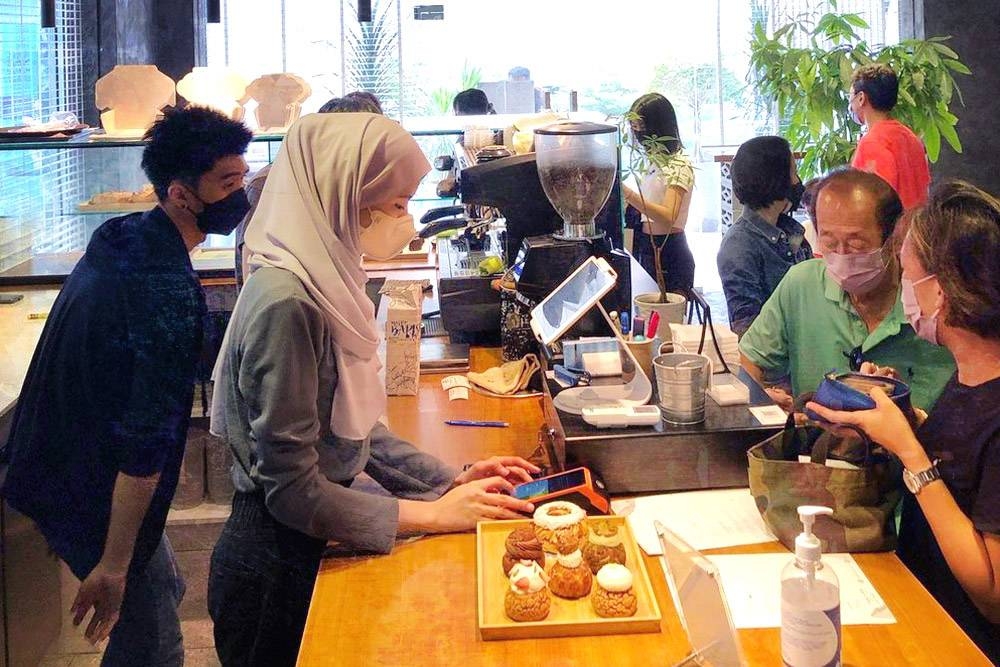
[ad_1]
COMMENTARY, July 23 — Is it just me or is sourdough bread sort of passé suddenly?
Has everyone gotten over the joys of baking during the Covid-19 lockdown? Perhaps not; sourdough bakeries, from home businesses to brick-and-mortar shops, are still very much thriving.
Perhaps it’s more of the ever fickle foodie masses moving on to the next shiny trend. Take pastry, for instance.
From fine French pastries such as delicate choux and caramelised canelés to less obvious suspects such as Italian bomboloni (filled doughnuts) and Japanese daifuku, we all seem to have discovered a new world beyond crusty, artisanal breads.

Every ‘bombolone’ (Italian style filled doughnut) by Sugar and I is made with care and love. – Pictures courtesy of Sugar and I
And just like their sourdough bread predecessors, these businesses operate both online and offline, though the latter is more prevalent as dining out becomes an activity everyone can enjoy again, post-lockdown.
(Also, there are only that many Instagram shots you can take of food delivered to your home before it gets repetitive; the textures of an exposed concrete wall or the sprawl of a gravel path with verdant bamboo plants make for more eye-catching backgrounds. There’s this, too, one supposes.)
What are pastries, then? Clearly the origins are enough to differentiate them — you don’t need to be a French pâtissier to elevate the humble doughnut (basically fried dough) to something more precious with the right filling and garnish.
The daintiness aspect seems to be key here, and a major draw. Take the elegant Japanese pastries created by Mimi Daifuku: the light dusting of flour akin to just fallen snow; the roundness of the chewy and bouncy mochi; the seasonal highlights such as a strawberry or mikan orange wedge, sweet and tart in equal measure; or even a luxurious kiss of gold leaf to impress.
You’d think these are made by Japanese artisans with decades of experience. Instead, Mimi Daifuku is founded by a twentysomething couple, Ryan Chan and Adeline Lee. Neither are from the F&B (food and beverage) industry; Chan comes from accounting and finance, whilst Lee has a graphic design and advertising background.
This outsider trait is more common than you might realise (see other pastry entrepreneurs below). The conventional belief is that many of these new pastry businesses are upstarts; fresh graduates from pastry schools that eschew joining a “proper”, well established bakery or pâtisserie in favour of starting their own ventures from the get-go.
The truth is rather less straightforward: more of these pastry entrepreneurs are simply foodies who have tired of their corporate nine-to-five grind and have sought out a more personally satisfying (and delicious) outlet for their creative energies.
Mimi Daifuku’s Lee had learned daifuku making during her travels in Japan, which spurred the couple to make Japanese pastries or wagashi as a business. Chan adds, “We are able to use the skills and knowledge that we learned — be it branding, photography and advertising — to create a variety of presentable gift sets for different occasions.”
There is also a clear opportunity to scale up. The Sugar and I siblings, Syed Mohd Ilyas and Sharifah Nur Ilisa — grew their home-based custom made cakes business to full-fledged shops (at SS14 Subang Jaya, Mitsui Lalaport KL and Mid Valley Megamall) by refocusing on bomboloni during the lockdown.
Ilyas shares, “We started from our home kitchen and sold items via word of mouth and Instagram. We identified that the market loved our bomboloni and cream puffs. From there we have expanded… and learnt a bit more about digital marketing.”

Orito draws the crowds with their popular choux pastries, including their signature Paris-Brest. – Picture courtesy of Orito
Sometimes a career switch is what this pastry trend is offering its purveyors. Orito’s Justin Tang originally studied chemical engineering but later travelled to Paris “to study Grand Diplôme in French cuisine and pastry at Le Cordon Bleu, Paris.”
After his return to KL, Tang started his own pâtisserie, focusing on making products such as his signature pastry, the Paris-Brest, “with only ingredients that are crème de la crème. Everything we make is hand-crafted with heart.”

Aimie Habban started Burrow to share her love of ‘canelés’ with her fellow Malaysians. – Pictures courtesy of Burrow
So perhaps starting a pastry business is a way for these entrepreneurs to match their passion with their own personal philosophy. Certainly that was the case for Aimie Habban, who founded Burrow, a bakery-café in Bangsar, to share her love of canelés with her fellow Malaysians.
It was a creative outlet for Aimie, who shares: “I had taken up baking and making coffee as a part time hobby in the past 10 years while operating a gas station business with my husband. So when the world went on pause because of Covid-19, we had plenty of time to regroup and rethink.”
So, no — these pastry businesses aren’t vanity projects. They can be lifesavers, an alternate source of income and revenue in uncertain times but also emotional salves for weary souls exhausted by the rigours of a long pandemic.
But these pastry artisans do have to treat it like a real business if they are to sustain and survive.

All About Chew’s Raspberry Softy pairs tart raspberries with white and caramelised chocolates. – Picture courtesy of All About Chew
All About Chew’s Yasmin JS advises, “Get registered with SSM (The Companies Commission of Malaysia), get an accountant — this is the best investment any business owner can make; it saves so much time and hassle! — and pay your taxes because if the home bakery kicks off and you want to turn it into something bigger, it would be a much easier task to raise capital funding.”
Given that she is taking her brand of chewy Chewibacca cookies and “softies” from a purely online venture to opening her first shop next month at The Five @ KPD in Bukit Damansara, this is advice well worth considering.
Will this fine and fancy pastry craze die down over time? Who knows? But even if it does, the businesses behind it are likely to last if they back their passion with prudence and perseverance. Just like all those sourdough bakeries, the best will not only survive, but even thrive.
For more slice-of-life stories, visit lifeforbeginners.com.
[ad_2]